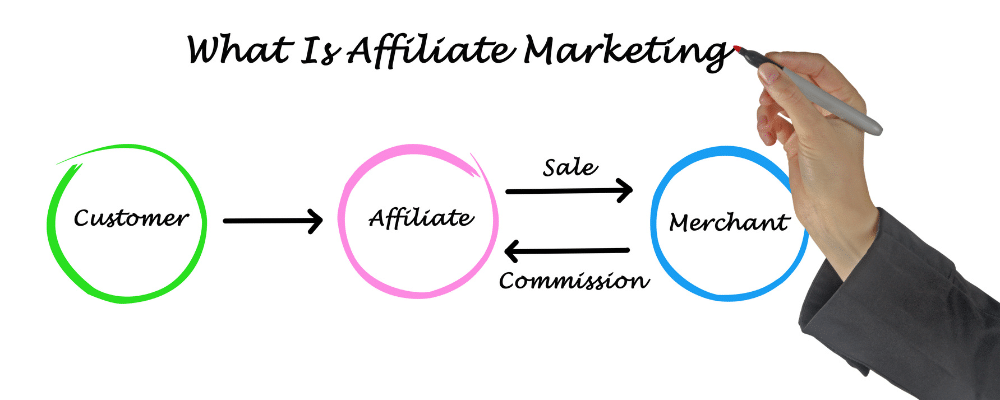Understanding Affiliate Marketing
As a business, taking the time to understand affiliate marketing and how you can leverage it as part of your digital strategy is essential. Whether you’re just starting out or already making strides in the world of online sales and revenue growth, understanding the various components of an effective affiliate program can position your company for success.
What Is Affiliate Marketing?

Affiliate marketing, in its simplest terms, is a strategic partnership between a business and various affiliates. These affiliates can be bloggers, influencers, or even other businesses that operate in a similar niche.
An affiliate works to promote a company’s products or services on their digital platforms- which include websites, social media, email newsletters, and blogs.
The promotion process usually involves the use of a unique referral link provided by the company. This link is embedded in the affiliate’s content, and when clicked, it directs potential customers to the company’s product or service page. If a purchase is made through this referral link, the affiliate earns a commission from the company.
This commission-based model makes affiliate marketing a performance-driven strategy as affiliates are incentivized to create engaging and persuasive content that will drive their audience to click on the referral link and make a purchase.
In essence, affiliate marketing is a mutually beneficial arrangement. The company gains increased visibility and potentially higher sales through the affiliate’s promotional efforts, while the affiliates earn revenue through commissions. This cost-effective marketing strategy helps leverage the power of digital platforms and online communities while also boosting business growth.
How Does Affiliate Marketing Work?

This straightforward process allows you to earn a commission by promoting another company’s products or services and let’s delve into the step-by-step process of how:
Join an Affiliate Program: The journey begins by signing up for an affiliate program. A wide variety of businesses, from small startups to large corporations, offer these programs. Usually, joining an affiliate program is free, making it accessible for anyone interested in becoming an affiliate marketer.
Choose Products to Promote: After you’ve joined an affiliate program, the next step is to select the specific products or services you want to promote. It’s crucial at this stage to choose items that align well with your platform’s content and are relevant to your audience. This ensures that your promotional efforts resonate with your followers and increase the likelihood of successful conversions.
Share Your Affiliate Link: Once you’ve chosen the products or services to promote, the affiliate program provides you with a unique affiliate link for each item. This link is what you’ll share on your own digital platforms, such as your website, social media accounts, or email newsletters. When your audience clicks on this link, they’ll be directed to the product or service page on the company’s website.
Earn Commissions: Here’s where the rewarding part comes in. Every time a purchase is made through your unique affiliate link, you earn a commission. The commission rate can vary widely from one affiliate program to another, but it’s typically a percentage of the total sale price. This performance-based reward system incentivizes affiliates to create effective promotional content that drives sales.
How to start an affiliate marketing program for your business
Starting an affiliate marketing program for your business can be a powerful way to expand your reach and increase sales. Here’s how you can get started:
1. Define Your Goals: Before you begin, it’s important to have a clear understanding of what you hope to achieve with your affiliate program; This includes increasing brand awareness, driving more traffic to your website, or boosting sales.
2. Understand Your Niche: Knowing your niche is crucial as it helps you identify the right affiliates who have an audience that aligns with your products or services.
3. Set Up Your Affiliate Program: There are various platforms available that can help you set up your affiliate program. These platforms handle the technical aspects of tracking sales and commissions.
4. Determine Your Commission Structure: You’ll need to decide how much commission your affiliates will earn for each sale. It’s important to offer competitive rates to attract and retain quality affiliates.
5. Recruit Affiliates: Look for influencers, bloggers, or businesses in your niche who can effectively promote your products or services. A good affiliate will have a strong online presence and a dedicated audience.
6. Provide Resources for Your Affiliates: To help your affiliates succeed, provide them with resources such as promotional materials, product information, and any other content that can assist them in their promotional efforts.
7. Monitor Your Program’s Performance: Be sure to keep track of key performance indicators (KPIs) like click-through rates, conversion rates, and total sales to evaluate the effectiveness of your program and make necessary adjustments.
8. Keep Your Affiliates Motivated: Regular communication, performance-based incentives, and prompt payment of commissions can help keep your affiliates motivated and engaged.
The Benefits of Affiliate Marketing
Affiliate marketing is a strategic approach that offers a wealth of benefits for both affiliates and businesses, and let’s take a look at how:
For Affiliates
Passive Income: One of the most attractive aspects of affiliate marketing is the opportunity to earn passive income. Once an affiliate link is in place, it has the potential to generate income around-the-clock, which means you can potentially earn money while you sleep, making it an appealing option for those looking to supplement their income!
Work From Anywhere: As an affiliate marketer, you’re not tied to a specific location. All you need is a good internet connection, and you can work from anywhere in the world.
No Customer Support: Unlike sellers, affiliate marketers don’t have to worry about customer support or service. This responsibility falls on the company whose products or services you’re promoting.
For Businesses
Cost-Effectiveness: Affiliate marketing is a highly cost-effective marketing strategy as businesses only pay when a sale is made- making it a low-risk investment with a high potential for returns.
Increased Brand Awareness and Sales: With affiliates promoting your products or services to their audience, your brand exposure increases significantly. This increased visibility can lead to more traffic and, ultimately, more sales.
Expand Market Reach: Affiliates can help you reach new audiences that you might not have had access to otherwise, which can greatly expand your market reach and increase your customer base.
The Challenges of Affiliate Marketing
While affiliate marketing has its perks, it also comes with challenges. For affiliates, building a substantial audience can take time and effort. Plus, maintaining trust and credibility while promoting products is vital.
For businesses, finding suitable affiliates who align with their brand values can be tricky. It’s important to ensure that the affiliates’ promotional methods are ethical and resonate with the target audience.
At the end of the day, affiliate marketing is a powerful digital marketing tool that benefits businesses by increasing sales and earning commissions for affiliates. However, success requires careful planning, ongoing effort, trial and error, and ethical practices.


